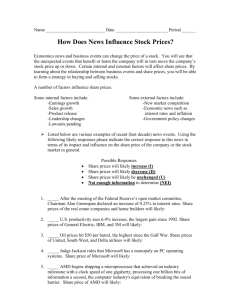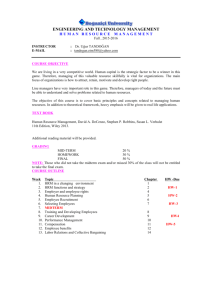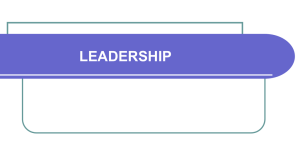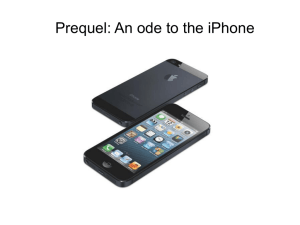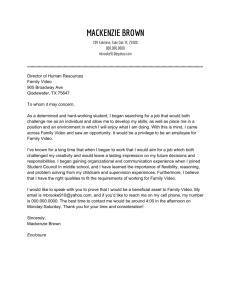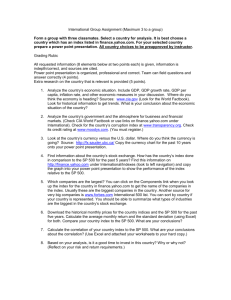ACCESS – New Media Ownership
advertisement
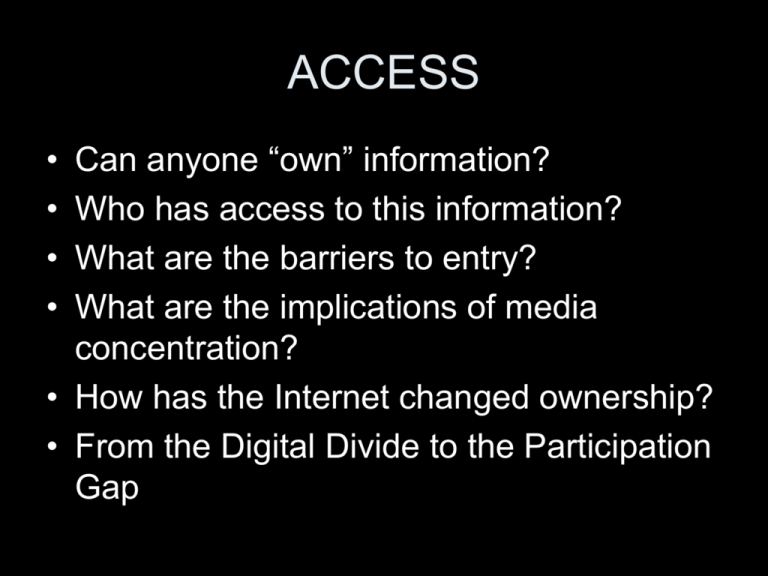
ACCESS • • • • Can anyone “own” information? Who has access to this information? What are the barriers to entry? What are the implications of media concentration? • How has the Internet changed ownership? • From the Digital Divide to the Participation Gap Markets vs. the Public Sphere A comparison of models The Market Model “society’s needs can best be met through a relatively unregulated process of exchange based on the dynamics of supply and demand. This model treats the media like all other goods and services” (15). The Public Sphere “media are more than simply profit-making components of large conglomerates. Instead, they are our primary information sources and storytellers” (20). Are the media different than Other Industries? “Profit seeking and public service are not either/or propositions. Instead, the civic responsibilities of media have historically been met within the framework of commercial business…[in the 80s] that delicate balance shifted even further in favor of pursuing greater profits over concern of public service” (31). What is the Public Interest? Market – Whatever the public is interested in Sphere – Media responsibility to…. a. Promote diversity (Avoid homogenity) b. Provide Substance (w/out Elitism) “The media’s role in facilitating democracy and encouraging citizenship has always been in tension with its status as a profit making industry…” (38) Which side do you fall on? Are these part of Mr. Media, or part of you? 2006 Most Visited Site, USA 2007 Most Visited Sites, US 1. Yahoo.com - Yahoo! Inc. 2. Google.com - Google Inc. 3. Myspace.com - News Corp. 4. MSN.com - Microsoft Corporation 5. ebay.com - eBay Inc. 6. YouTube.com - Google Inc. 7. Facebook.com - Facebook 8. wikipedia.org - Wikimedia Foundation, Inc. 9. craiglist.org - craigslist, inc. 10. live.com - Microsoft Corporation 11Amazon.com - Amazon.com, Inc. 12. Blogger.com - Google Inc. 13. Go.com - The Walt Disney Co. 14. AOL.com - Time Warner 15. microsoft.com – Microsoft Co. 16. CNN.com - Time Warner 17. Comcast.net - Comcast Co. 18. IMDb.com - Amazon.com, Inc. 19. Flickr.com - Yahoo! Inc. 20. Photobucket.com - Photobucket, Inc. http://www.freepress.net/content/top20websites alexa, 2007 2009 Most Visited Sites, US 1. Google (6.79%) 2. Facebook (4.99%) 3. Yahoo! Mail (4.26%) 4. MySpace (3.06%) 5. Yahoo! (2.82%) 6. YouTube (1.76%) 7. Windows Live Mail (1.66%) 8. MSN (1.53%) 9. Yahoo! Search (1.43%) 10. eBay (1.10%) 11. Gmail (0.92%) 12. Bing (0.73%) 13. AOL Mail (0.57%) 14. AOL (0.55%) 15. Google Image Search (0.47%) 16. My Yahoo! (0.44%) 17. Wikipedia (0.43%) 18. Amazon.com (0.39%) 19. Yahoo! News (0.38%) 20. Craig's List (0.36%) http://www.businessreviewonline.com/internetweblog/archives/2009/08/top_20_websites.html Most Visted Sites, Globe Internet is shifting our fundamental Access to Information “You” as information gatherers http://video.winzy.com/play/1042416194030 http://video.yahoo.com/video/play?vid=1114772555 Kevin Sites in Yahoo’s Hot Zone http://hotzone.yahoo.com/ How are the major News Outlets using this phenomenon? • CNN – IReports – http://www.cnn.com/exchange/ • Yahoo – YouWitness News – http://news.yahoo.com/you-witness-news • MSNBC – Citizen Journalism Report – http://www.msnbc.msn.com/id/6639760/ • Neighborhood America – http://www.neighborhoodamerica.com/ You as expressive…. “I think that understanding that there might not be any difference between what people are doing online and offline is something really important” (M. Zuckerberg, 2006) Facebook facts • • • • • • Originated on February 4, 2004 Originator: Mark Zuckerberg Microsoft owns 1.6% of Facebook (240m) Estimated Total Worth – 15 Billion More than 57 million active users Sixth-most trafficked site in the United States (comScore) • More than 65 billion page views per month • More than half of active users return daily Changing Communication “Facebook members invariably cite its usefulness for keeping up with friends, but clearly one of the reasons that the site is so popular is that it enables users to forgo the exertion that real relationships entail.” (Me Media, 2006) Zuckerberg on Facebook What does facebook change about how we think of: • • • • Access and Trust Privacy Expression of real selves New forms of social interaction You as Movers… “When Social Media Become movers” “The collapse of transaction costs makes it easier for people to get together—so much easier, in fact, that it is changing the world” (48) Shifts in Access “We now have communication tools that are flexible enough to match our social capabilities, and we are witnessing the rise of new ways of coordinating action that take advantage of that change” (20). Shifting Information Flow 1. Sharing 2. Cooperation (Production) 3. Action (Collective) “Ridiculously easy group-forming matters because the desire to be part of a group that shares, cooperates, or acts in concert is a basic human instinct that has always been constrained by transaction costs” (54). New media and new Access are not always strengthening diversity and choice… How do/should/will corporations respond to trends in new media? How does new media shift the access we have to information? – For better or for worse?
